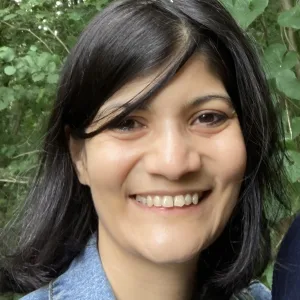
Prof. Karishma Jain is Teaching Professor of Sustainability and Innovation, at the Department of Physics, University of Cambridge. She has a strong interest in postgraduate education, and at the intersection between science, technology and sustainability. Prof. Jain looks to combine thinking from the Humanities and Social Sciences with the so called ‘hard sciences’ for a more holistic view of sustainability and innovation in education and research.
Prof. Jain teaches the Nurturing and Managing Innovation in Science (NMIS) module to NanoDTC students and students on the MPhil in Micro-and Nanotechnology Enterprise. She approaches innovation as problem-solving, but in a much more complex space involving a variety of human, institutional and ecological interactions, compared with traditional problem solving in the scientific space. She also teaches a version of the NMIS module as an elective for Part III Physics students, and co-teaches one for the Data Intensive Sciences MPhil.
Prof. Jain is Co-Director of the Centre for Doctoral Training in Nanoscience and Nanotechnology (NanoDTC) and the PhD in Interdisciplinary Nanoscience and Nanotechnology. She is a Fellow of Darwin College and a Fellow of the Higher Education Academy (FHEA). She is also the Deputy Director for Postgraduate Education at the Department of Physics.
Prof. Jain’s current research projects include LEAP Lab: Living Experiments in Arts-Science Practice to Re-imagine Sustainability and a book project on Re-imagining Science Institutions that would be more aligned with long-term prosperity, to be published by Bristol University Press.
Before her move towards postgraduate education and interdisciplinary work at the intersection between science, technology and sustainability and innovation, Prof. Jain did a PhD in Applied Physics (Nuclear Acoustic Resonance) at the University of Cambridge and before that she did a degree in Chemistry at the Indian Institute of Technology, Kanpur and an Masters in Micro- and Nanotechnology Enterprise at the University of Cambridge. She has been strongly involved with science-based startups during her career, initially through her work at a US-based Nanotechnology Venture Capital firm and more recently as a mentor for several startups emerging from research ongoing at the NanoDTC and as Scientific Advisory Board member for a scale-up working on terahertz technologies and water.
